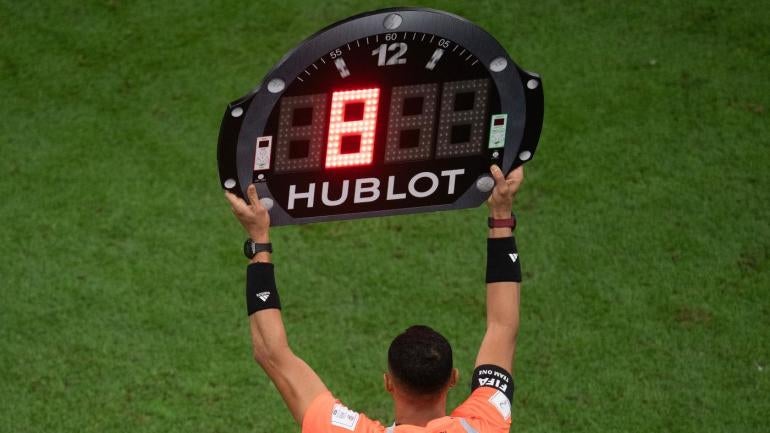
The 2023-24 Premier League season will feature lengthy periods of added time as we are currently seeing at the FIFA Women's World Cup Down Under but also at the FIFA 2022 World Cup for men in Qatar last year. It is part of a move to combat time-wasting tactics which will see players penalized more often if they try to do so. Games running 90 minutes plus 10 additional minutes or more will become part of the new normal under the incoming rules which the World Cup is already doing a good job preparing you for.

Golazo Starting XI Newsletter
Get your Soccer Fix from Around the Globe
Your ultimate guide to the Beautiful Game as our experts take you beyond the pitch and around the globe with news that matters.
Thanks for signing up!
Keep an eye on your inbox.
Sorry!
There was an error processing your subscription.
We explain why this is happening:
What does this change mean?
Moving forward, players are less likely to waste time because it will not -- in theory -- run down the clock effectively as it has done in the past. Players kicking the ball out of play and simulating injury, two popular and traditional time-wasting tactics, should become a thing of the past. This is because those things will no longer eat into the 90-minute total running time of a soccer game thanks to the new rules which will now factor those periods of time into the overall duration of fixtures.
Where and when will this be happening?
It is already happening at the international level, but you will now start seeing it in the Premier League and across the English soccer pyramid too. English Football League games got underway last weekend with these changes in place, the FA Community Shield between Arsenal and Manchester City played to these new rules at Wembley Stadium and all Premier League games kicking off from August 11 will feature this new legislation.
Who decided this and why?
The International Football Association Board (IFAB) are trying to "create fairer conditions for both teams in terms of the amount of time available in a match." Premier League officials are concerned by the fact that the average amount of time that ball is in play during soccer games is actually around 55 minutes per 90. That is approximately 35 minutes which is 10 minutes shy of an entire half of a soccer game with the figure even worse below the English topflight. Essentially, it is an effort -- albeit an extreme one -- to ensure that 90 minutes of actual soccer gets played by the players and consumed by spectators.
How will they do it?
Refereeing will take a hardline stance with time wasting caused by goal celebrations, injuries, substitutions and dead ball situations such as throw-ins, goal kicks, free kicks and penalties. Game officials now have the power to punish players and managers for "clear and impactful actions" to run down the clock. Disagreeing with referees will be punished more severely while physical contact will be given greater leniency and managers will be limited to their technical areas. Expect around 10-15 minutes on top of the regulation 90 in the Premier League -- especially with clubs still allowed to use five substitutions with VAR also lengthy in use and concussion protocol also factoring into consideration.
So, games are no longer 90 minutes?
Judging by the first weekend of this new rule at EFL level, all 35 games featured at least eight additional minutes with a few games finishing two hours after the official start time. Northampton 0-1 Stevenage in League One clocked a staggering 22 minutes and 36 seconds of additional time -- one full quarter of a regulation 90-minute game -- while Middlesbrough 0-1 Millwall in the Championship had the shortest amount of added time with eight minutes and 45 seconds. Only one other game clocked less than 100 minutes in total and that was Bristol City 1-1 Preston North End at nine minutes and 55 seconds. The second half of Stoke City 4-1 Rotherham United did not kick off until 13 minutes after the hour owing to two goals late in the first half which extended the opening 45.
Are players, managers and fans furious?
"We had a meeting last week with the FA," wrote Manchester United's Raphael Varane. "They recommended from the referees new decisions and rules. From the managers and players, we have shared our concerns for many years now that there are too many games, the schedule is overcrowded, and it's at a dangerous level for players physical and mental well-being. Despite our previous feedbacks, they have now recommended for next season: longer games, more intensity, and less emotions to be shown by players. We just want to be in good condition on the pitch to give 100% to our club and fans. Why are our opinions not being heard? As a player I feel very privileged to do the job I love every day but I feel these changes are damaging our game. We want to be at our maximum level, the best we can be and put on amazing performances for fans to celebrate every week. I believe it is important that we, players and managers, highlight these important issues as we want to protect the game we love and give the fans our best."
"It's a question for big brain guys who decide these things," added Manchester City boss Pep Guardiola. "It is a lot of games and every time you add eight or 10 minutes it is a... but listen, they never consult our opinions, the people in world football, managers or players. Now, every game we are going to play for 100 minutes. Wasting time, from my point of view, it is not going to be solved by extending 10 more minutes. It is more tiring for the players. It is too much."
Both Varane, who is now retired from international soccer at the relatively young age of 30, and Guardiola have a valid point. Adopting an average of 10 added minutes per game for the sake of this argument, a 38-game Premier League season will have taken on the equivalent of almost four extra games by the end of a full campaign. Factoring in two domestic cups, continental action for the top sides, a hectic festive period which other European rivals already take at least short or even extended breaks during, plus an approaching summer with a UEFA European Championship and soccer at the Olympic Games, the argument that there is too much soccer being played by professionals is stronger than ever. As for the fans, games running over by a few minutes can sometimes make all the difference in terms of travel arrangements, so lengthy additional periods will likely wreak havoc on away days. It could also complicate broadcasting deal logistics, not to mention the fact that even longer games could actually switch some consumers off from attending or watching entirely.
Have we seen this before?
With the Women's World Cup. Sweden advanced past the USWNT 5-4 and England edged Nigeria 4-2 but both needed penalties to book their quarterfinal berths and neither game saw a single goal across two lots of added time until spot kicks came into play. However, this World Cup has not simply felt longer solely because of two games going all the way to the drama of penalties. A number of different factors have contributed to what has at times been a testing watch worsened by the time difference with the games being played Down Under. Specific to this current Women's World Cup is the fact that were already 14 goals in the 90th minute or later during the group stage and that does not even factor in a few 89th-minute efforts which also helped to crank up the drama as well as the time added on.
Goals beyond the 90-minute mark have been fairly commonplace and some games have even seen added time run for more than 10 additional minutes which has only added to the sense that these fixtures have run longer than most. Right now, it is the World Cup and it is the absolute pinnacle of soccer in both the women's and men's game with so much at stake once you reach the knockout phase. The success or failure of entire campaigns can turn on one single moment of a game so naturally pragmatism is at its absolute height once you get to this stage of the tournament -- this is nothing new. Similar can be said at this stage of most competitions, such as the UEFA Champions League, but it feels amplified that much more on the world stage given that it does not happen every year and that all eyes are on the national teams as opposed to clubs.
Will this influence tactics?
Some players and head coaches thrive on knockout cup soccer tension while others are better suited to exhilarating soccer created by throwing caution to the wind during a standard league game. The latter approach rarely works at this stage of a tournament such as the World Cup so do not suddenly expect to see players being let off the hook the closer we get to the WWC final. If anything, things could get even tighter from here -- you only need to look back to the men's World Cup in late 2022 to see similar examples with the knockout phase featuring five games which went all the way past extra time to penalties. Even the final between eventual winners Argentina and France ended up going all the way in highly dramatic fashion.
Perhaps the most pertinent example from Qatar was the goalless draw between semifinalists Morocco and Spain which was excruciating for 120 minutes and then featured three converted penalties in the shootout to further exacerbate the tedium. Interestingly, though, grinding elimination games down over 90 minutes and through lengthy extra time to reach penalties can sometimes form part of a blueprint to success at a World Cup. Again, looking at the men's event from last year, two quarterfinals on the same side of the draw were decided from the spot -- Argentina beat the Netherlands while Croatia eliminated Brazil. In fact, both victors relied on penalties twice with the South Americans going all the way despite those two outings and an opening defeat to Saudi Arabia and the Europeans getting to the semis.
Croatia did similarly back in 2018 with three different games going to at least extra time as they reached the final so it can be part of a tournament strategy. That said, it taxes the players massively so it is no surprise when the players run out of gas at one point and sometimes suffer blowout defeats not in keeping with the tight nature of their other performances. Given Sweden or Japan's potential routes to the final, it would not be a surprise if that quarterfinal and a potential semifinal against the Dutch turn out to be low-scoring affairs that potentially go beyond 90. It is harder to adapt to a full league and cup season, though, so expect to see bigger squads, greater rotation and possibly completely different home and away tactics as teams grapple with the new rules.
Any other new rules?
Another new rule which has flown a bit under the radar for now is that managers and coaches "must not confront, invade the personal space of, or make physical contact with the match officials." Yellow cards will be given to players delaying the resumption of play or not respecting the regulation distances on set pieces such as free kicks. Arsenal's Thomas Partey and City's Julian Alvarez were both cautioned for kicking the ball away after the referee's whistle blew last weekend while Arteta saw yellow for arguing that Rodri should have been booked: "We are going to get used to it," said the Gunners' Spanish boss. "It is very difficult to change habits straight away but that's the demands they are putting on us. We are going to have to train for it and be ready for it because, if not, we will be playing without 11 players and a manager on the touchline very often."





















